WritingSummary For The Week Ending 08/31/2023
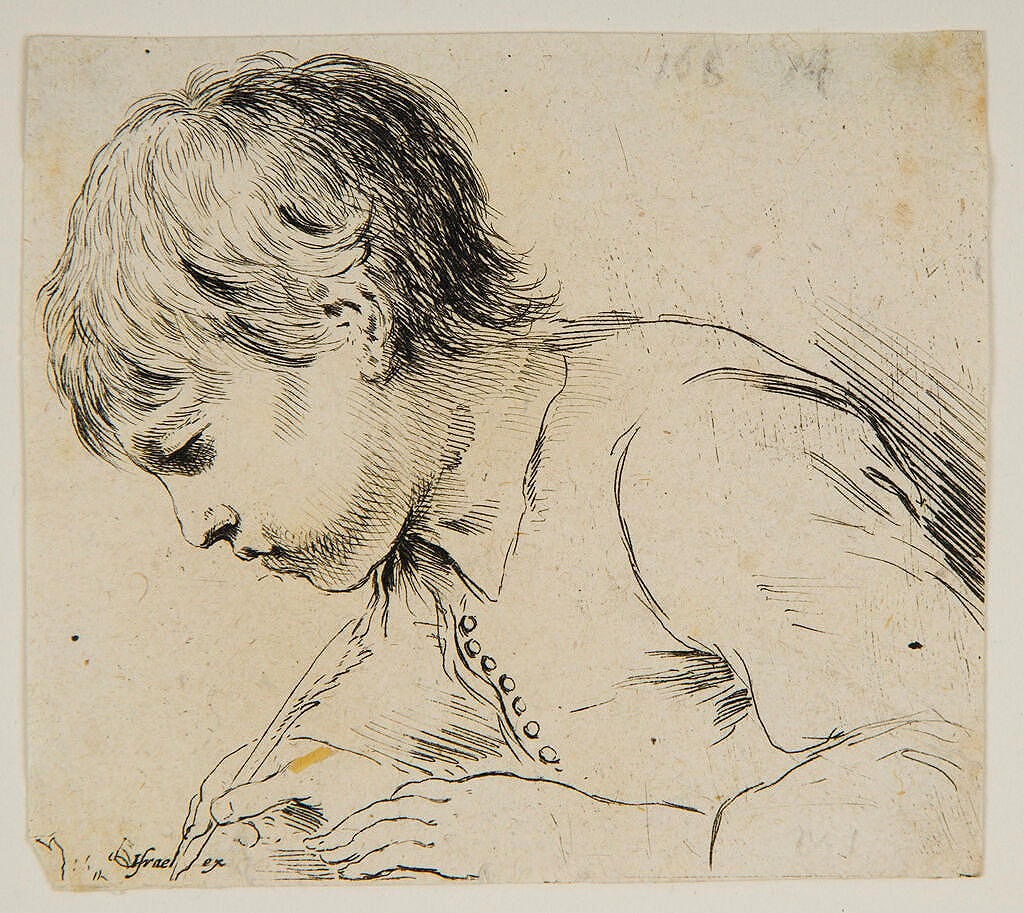
Stefano Della Bella: Boy Writing (17th century)
Something More Suited For The Ages
I sometimes forget just how very delicate everything is. Nothing's robust or built to last. Everything’s destined to dust, however unlikely that fate seems near the beginning of anything. That head of fresh lettuce seems eternal until a few days later, when it, too, betrays your trust. I flipped my compost heap this week, an infrequent pleasure I'd delayed due to a volunteer pumpkin vine that had sprouted out of the middle bin early in the season.
FairTrade

Hans Sebald Beham:
Dansend boerenpaar [Dancing Farm Couple] (1537)
" … invulnerable to most of the ailments common to mere fair visitors."
Like every public entity, Fairs operate on an Upstairs/Downstairs model. There are insiders, and then there are visitors. Staff and exhibitors live on the inside while guests remain on the outside, even after paying their admission fee, largely ignorant of the machine supporting their experience. The visitor might see the gatekeeper but will register few of the insiders making their experience possible, for insiders try hard to remain invisible. One might see somebody with Security printed on their jacket but never really witness security in action, escorting an unruly guest to the gate or invisibly monitoring booth traffic. This year, given that The Muse has contracted for exhibit space to advertise her candidacy for Port Commissioner and interact with voters, She and I get to be Fair insiders.
I revel in the permissions granted me.
TheTurning
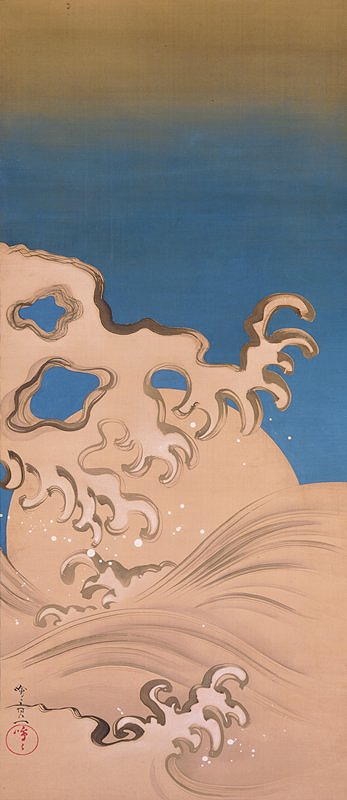
Suzuki Kiitsuexpan:
Moon and Waves
(First half of the nineteenth century)
" … surveying my small kingdom …"
However subtly this season might start to change, it finishes the job in a swoosh. A mighty wind blows the last complacency aside, and the world turns upside down in a single afternoon. Change seems to resist itself for the longest time before finally caving into its inevitable, unable ever after to recover what it ultimately could no longer retain. It's always been the same. The only question has always been precisely when, a question without anything resembling a reasonable response. TheTurning does not pivot on preciselies but on eventualities. Eventually, inevitably, the change appears, however lengthy the preceding longing might have been.
The Fall term starts as if to set off TheTurning.
Fairness
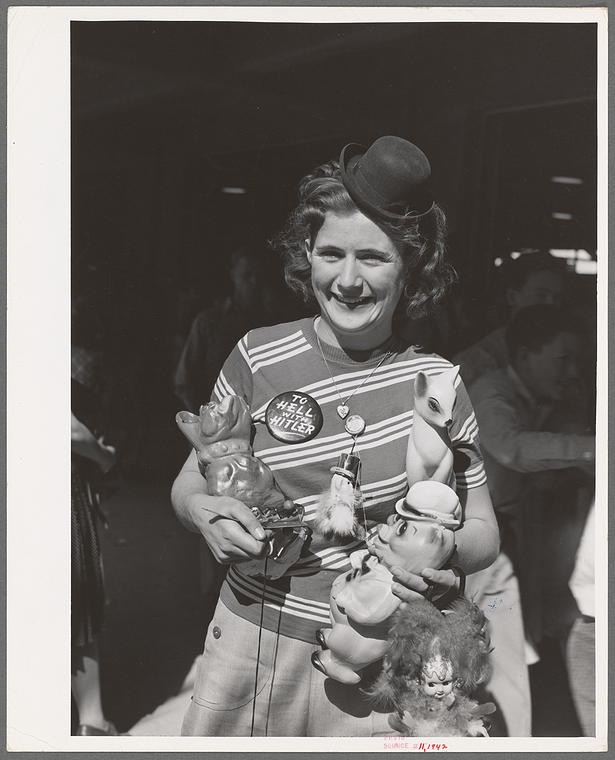
Russel Lee: At the Imperial County Fair, California
(1942)
"Everybody heads home a winner anyway!"
I feel confident that I have no idea how to describe The Southeast Washington Fair and Rodeo, though I've attended this celebration for more than sixty years. The "Fair" seemed enormous and exciting in my youth, a vast playground of unusual sights and experiences. Rides, sure, but also animal barns where the farm kids would camp out with their prize stock and walk around with straw in their hair. In the old days, the Midway was a place of awe and petty crime where carnies and unlikely charlatans took the usual advantage of gullible townies. One of those sharps correctly named my first-grade teacher's first name, an astounding feat made more remarkable by the fact that her name was Pearl. What were the odds besides impossible? That single transaction convinced me to avoid betting on anything ever again. The odds are very likely somehow invisibly in someone else's favor.
The modern-day Fair seems tame, down-right lame in comparison.
MoreAuthentic

John Downman: Attention
(n.d., late 18th, early 19th Century)
"Whomever created this clockwork universe seems to have installed it backward."
We deem old stuff as MoreAuthentic than more modern things. We seem to revere the good old days with our language, for it seems to disparage newness. They must actually not build them like they used to; every updated everything, worse, slower, and ultimately more expensive rather than better, faster, or cheaper. Upgrades degrade performance and disable familiar capabilities and should be deferred as long as possible. Replacement parts invariably fail to fit properly or seem so much more cheaply manufactured that they never quite match original surroundings. New and improved prove to be an oxymoronic marriage incapable of fulfilling its promises. We remain wary of improvements and most likely should be. Progress never was anybody's most important product; entropy was.
When penny candy costs a quarter, the future has arrived as feared.
Authentic

Jozef Israëls: A Laren Scene (1905)
" … a caricature of its original intentions."
Here in The Napa Of The North, we're noticing an encroaching reduction in authenticity as the BIG growers buy land and move into this valley. Main Street, which once offered every service imaginable in its few short blocks, now primarily features what the locals call Cute Crap Shoppes and wine-tasting rooms, so many that I haven't mustered the courage to enter any of them. They seem undifferentiated, each featuring essentially the same decor and identical ambiance. Perhaps the wine's unique to each, but I doubt that. If I attempted a tasting tour of Main Street, I doubt I could make it there and back again without over-indulging on modest pours and origin stories. Each winery and vineyard must possess a founding myth and an abiding ethos to justify its existence. The wine business never really was that much about wine.
Visitors arrive aching to experience The Walla Walla Difference.
SlippingAway

Utagawa Hiroshige 歌川 広重:
Yoshitsune Awaits Benkei at Gojo Bridge (c. 1840)
“ …leaves drying before turning …”
Summer, above all seasons, seems just to slip away. Once fierce, it tames. Its once dominant sun loses weight. Somebody blows out some of her candles. Even when the thermometer hits eighty, it's a toothless and unconvincing heat. It's just going through the motions with almost another month left where it will be expected to continue fulfilling obligations. The time for frying eggs on sidewalks has already past. Successive cues will continue before this season's gone, but it’s now become an imposter and will not return until next year.
Summer became the scariest season, replacing Winter over recent years.
Returning
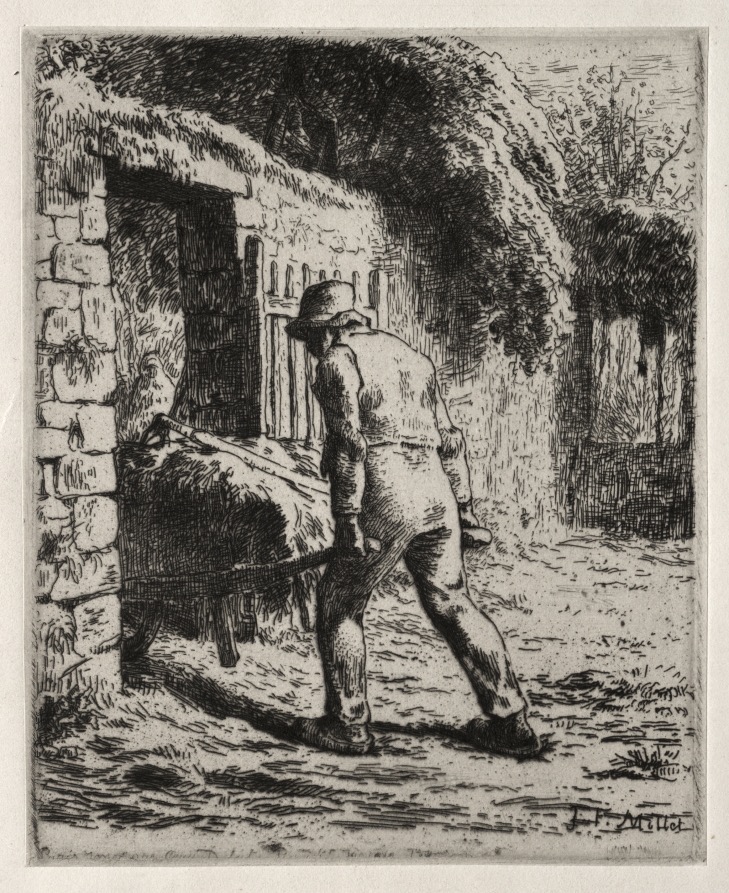
Jean-François Millet:
Peasant Returning from the Manure Heap (1855–56)
"Nobody needs everlasting anything."
Returning rarely carries the cachet leaving exudes. Departure reeks of adventure, while Returning more often smells of dirty underwear and sour beach sand warming in late summer sunshine. Whatever the season, it will seem to have changed during the absence. Summer will suddenly be leaving, when a week before it had settled in until at least November. The first signs of Autumn will appear in some sunburnt Vine Maple still turning color despite the drought's malign influence. While leaving seemed an escape, Returning seems an acceptance. However adventurous the departure seemed, Returning requires genuine courage to face with renewed dedication what might have driven you away.
The hero never returns from his adventures.
WritingSummary 08/24/2023

Utagawa Toyohiro:
Cuckoo at Tsukudajima (Edo period, 1615-1868)
Necessary But Rarely Obvious
I never seem to know when I need a vacation. This year, this season, I came as close as I've ever come to understanding that when. I had become bored with the merely extraordinary. I had become unsatisfiable by most any measure. I felt simultaneously over- and underwhelmed. I felt damned, and for no really good reason. The Muse insisted that we excuse ourselves and just disappear for a few days. I even called a morning's moratorium on new writing, a permission I only rarely ever extend to myself. The absence seems to have worked. We returned last night after four hundred road miles along some of the world's most beautiful country, and I landed feeling especially blessed. The Muse made pesto for her birthday supper, and I went to bed convinced that all was right with this world again. I woke feeling behind but probably capable of coping again. That renewed coping capability might be the only purpose for vacationing. Nothing else seems to explain why it's so necessary but rarely obvious.
ValleyOfThe
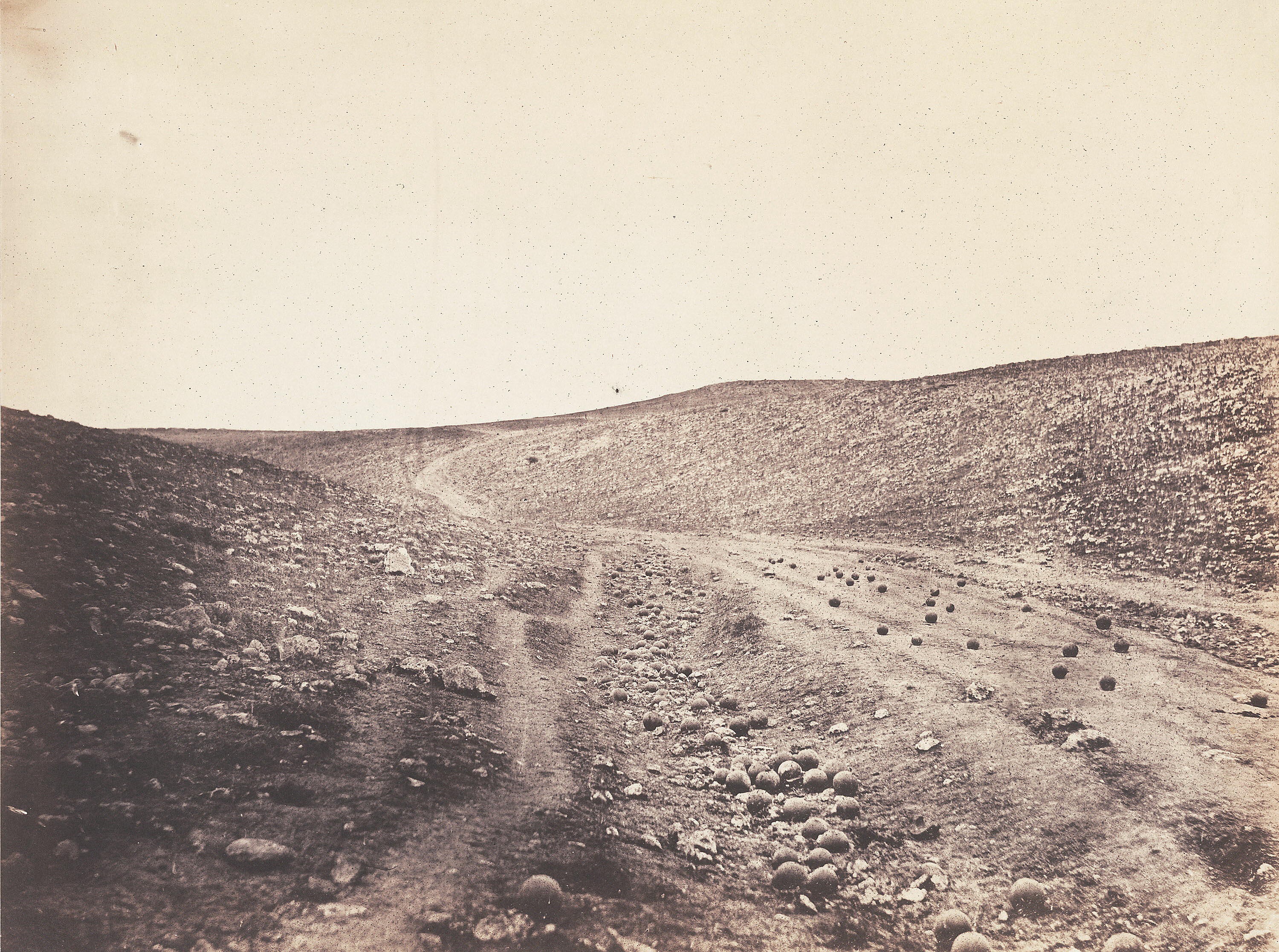
Roger Fenton:
The Valley of the Shadow of Death (1855)
"Stories never end."
The Old Wives insisted that deaths arrive in threes. I remember this notion being considered fact from my earliest recollections. I remember it proving true, too, which seemed even more disconcerting, for it was one thing to presume and quite another to experience confirmation. After my great-grandmother died when I was twelve, I dreaded another funeral for weeks after that event. These days, I've matured enough to recognize the fundamentally random distribution of such events and how my parsing can make unrelated events seem causally associated. I remain wary. When one drops, I anticipate a follow-on. When that occurs—notice how I didn't use the descriptor 'if'—I always expect a third and am rarely disappointed, though successfully anticipating departures doesn't qualify as a win. "There it goes again," I mumble to myself. Whoever posited that third time's a charm was not paying close enough attention.
I wrote this week about losing my dear friend TheAngelClair.
Waiting...
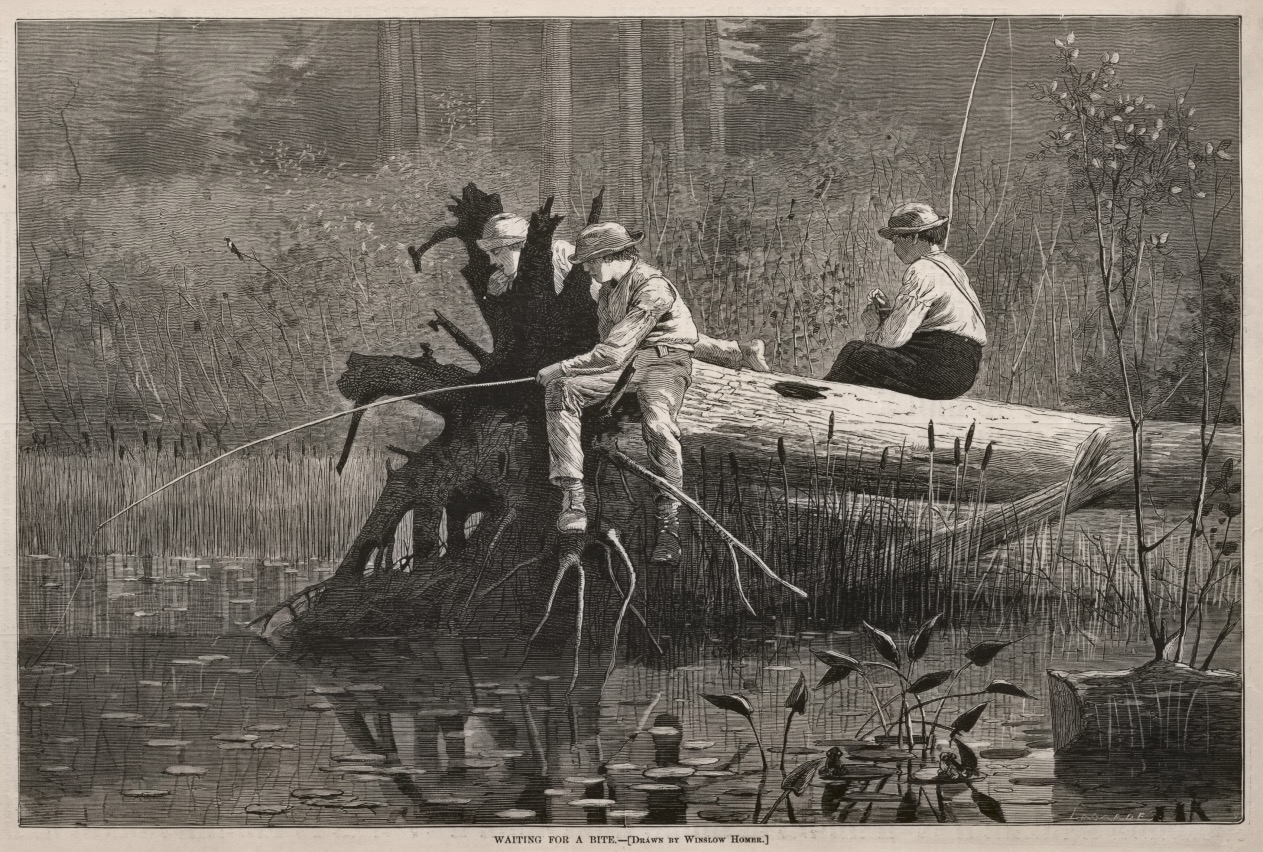
Winslow Homer: Waiting for a Bite (1874)
" … reduced to roughly the equivalent of the quality of your Waiting…"
(I submit this story in recognition of The Muse’s birthday.)
No travel guidebook worth its salt would dedicate a chapter to the underappreciated art of Waiting… . This one will, though strictly speaking, this collection of Honing Stories doesn't quite qualify as a guidebook, or at least not as a conventional one. I've reported before that I have little use for guidebooks. Nobody can ever recreate another's travel or adventure, so one should properly read guidebooks only as biography or fiction—probably fiction—and work hard to avoid trying to replicate the author's experience with their own. It cannot be done, and attempting it will very likely ruin your vacation. All that said, I will try today to write a sincere appreciation of the magnificent and underappreciated art of Waiting…; for some significant portion of every adventure, every vacation, every damned day gets expended with Waiting…, and we seem ill-prepared for this effort.
The Muse and I checked the ferry schedule to learn that we would have needed to schedule our trip sometime in the past to secure a reservation on any crossing before nine-fifteen that evening.
YachtSeen
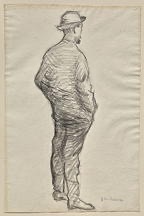
Gustave Caillebotte:
Study of a Man with Hands in His Pockets (1893)
"Let the inquiry fail to resolve the mystery."
The Muse and I, putting up in an ancient Bridge Tender's Shack while visiting old friends in a small hamlet on Puget Sound, encountered a culture for which we have no referent. We can register its presence but cannot reason ourselves into comprehension of it. The Yacht Culture, the denizens of which tie up their vessels at the modest town dock, which the deck of our tiny shack overlooks. The Muse Googles to find that the biggest one would sell for well over a million dollars and comfortably sleep six couples. Our friend recalls watching one embark with a crew following their captain's directions via Bluetooth headsets. Such grandeur! Such pretense!
I cannot imagine that scale of existence, the idle time required to engage in it, or the wealth needed to support it.
Rememberer
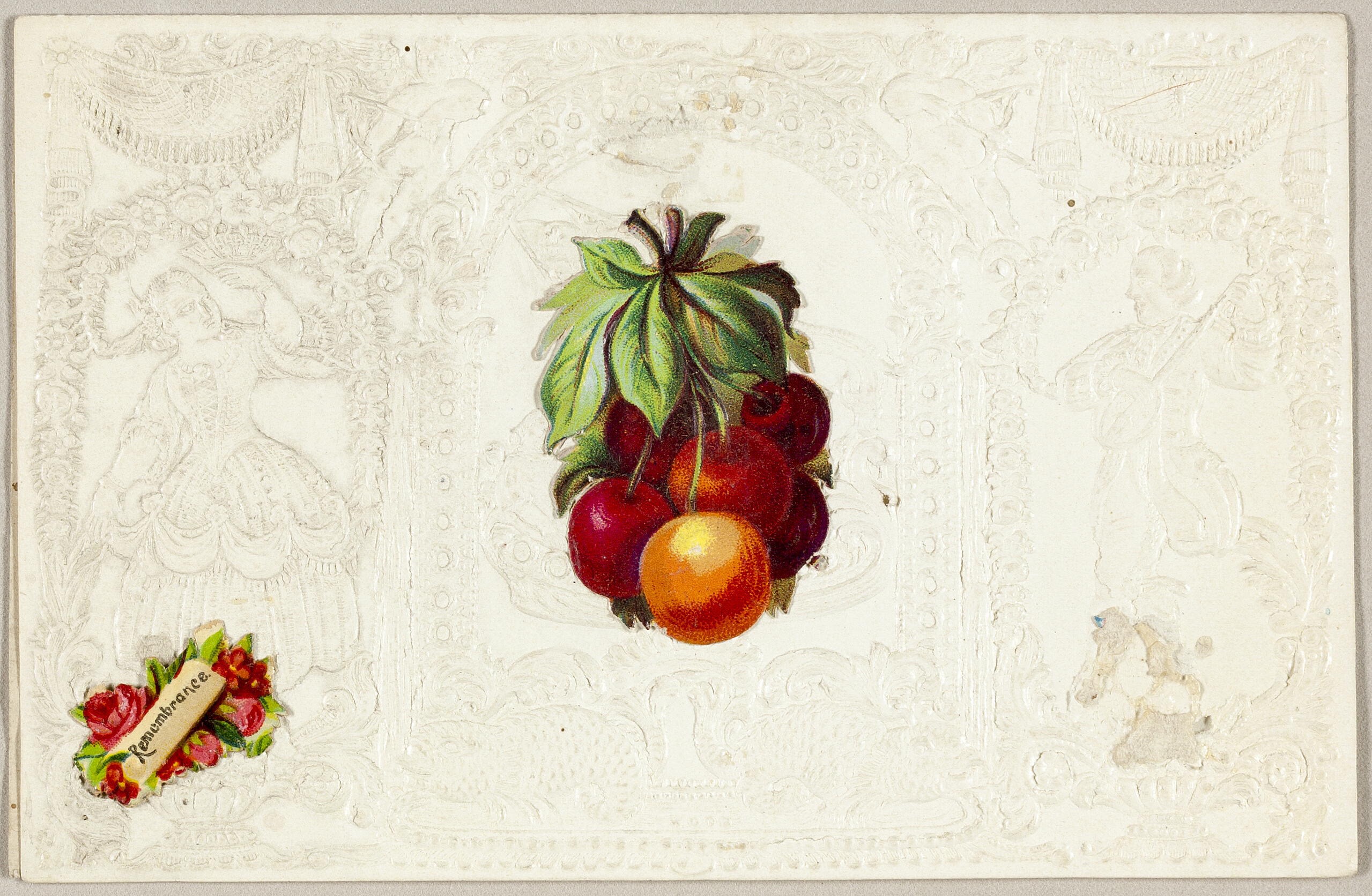
Thomas Wood: Remembrance (valentine) (c. 1850)
(I could find no biographical information on this artist.)
"They hold us upright …"
Of all the roles I have played and continue playing in this life, the role of Rememberer might qualify as the sleeper. I focus most of my energy into my role of primary experiencer, for that seems to be the most purpose-laden role available. I make my history by engaging in the innumerable activities that will eventually comprise my history. I never schedule time to set aside engaging to do some serious remembering, even though much of my activity involves writing, which relies upon recollections. I never catch myself stuffing away reflections. They seem to accumulate more or less automatically, never by me more tightly focusing my attention. Indeed, squinching my mind in order to capture memories better seems paradoxical. One does not really capture anything for later consumption. Some stuff just seems to stick.
I remember visiting St. Peter's in Rome only to find the place overrun with people carrying video cameras attempting to capture their visit to St. Peter's.
TheAngelClair
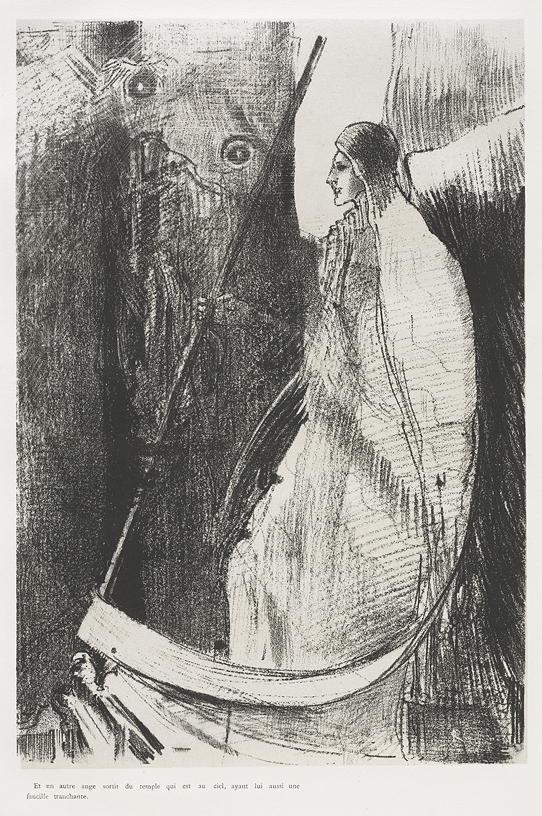
Odilon Redon: THE APOCALYPSE OF SAINT JOHN
And Another Angel Came Out of the Temple
which is in Heaven,
and He also Having a Sharp Sickle
1899
"Travel well, ya old bastard!"
On the morning of my seventy-second birthday, I received news from an old Takoma Park neighbor that our mutual friend and former neighbor Clair had died of congestive heart failure and dementia. I had anticipated and dreaded this news since my last visit to our exile. On that visit, Clair had agreed to fetch me from some bus stop somewhere but was uncharacteristically tardy. I started walking the route I knew he'd take, and eventually, he came along in his familiar red Prius, though it seemed to have suffered extensive front-end damage. He pulled over, I clambered in, and we retired back to his familiar home next door to the site of the first rental of our exile. He explained that it was "the damnedest thing" that his car seemed to damage itself. Michele, his artist wife, was displeased that he was still driving. He slurred his story.
I'd met Clair one bright June Sunday morning.
Vacatering
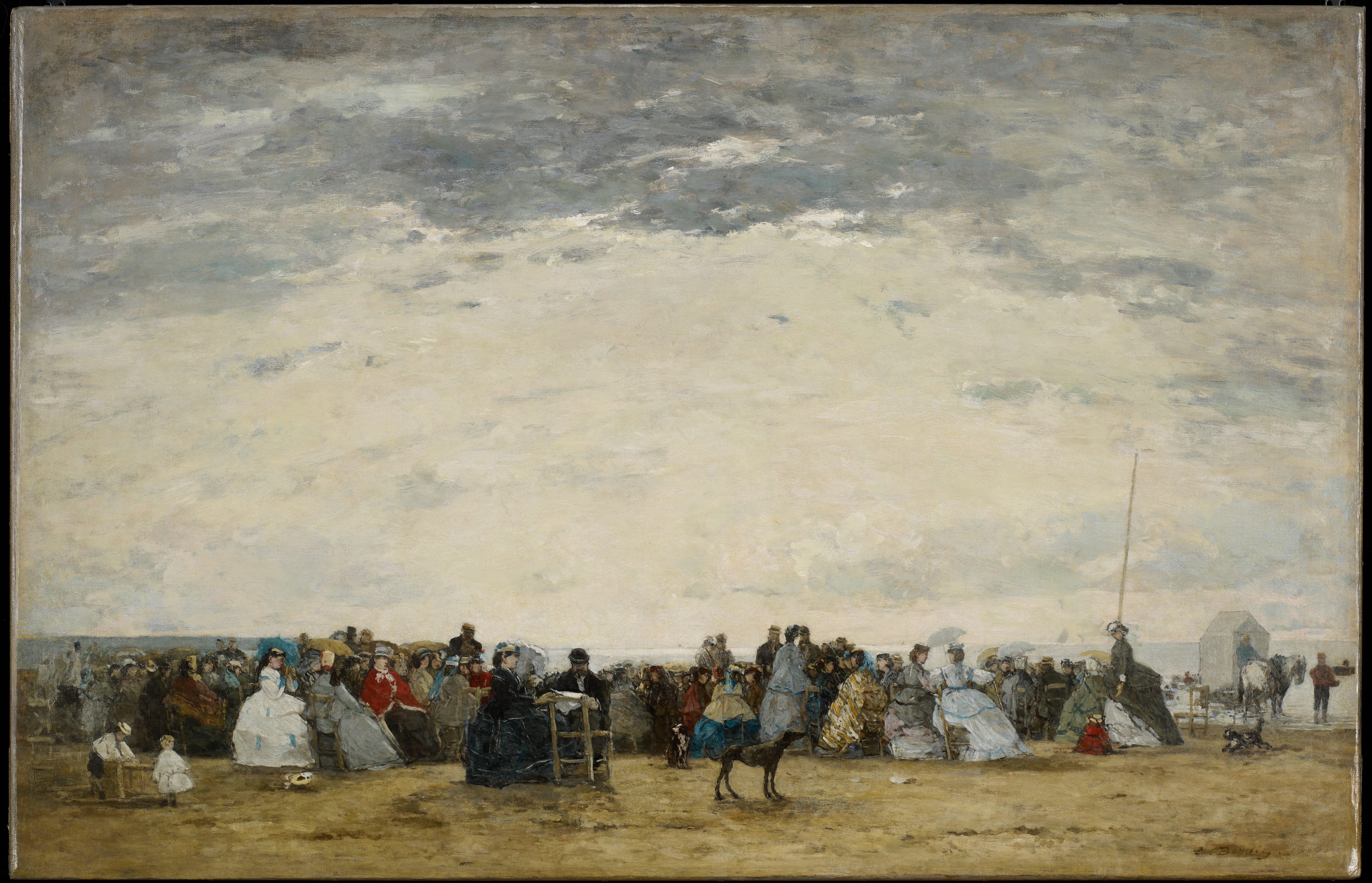
Eugène-Louis Boudin:
Vacationers on the Beach at Trouville (1864)
" … every other place an also-ran."
We simply must leave preparation for the very last minute. The Muse must run out to The Home Despot as the sun sets to buy replacement parts for the watering computers we hadn't used since we couldn't remember when. Leaving home in mid-summer makes no sense because who will water in our absence? We have a long history of losing plants when our automatic watering system fails. I can't use the damned things because their user interface is written in machine language. The Muse can even change their batteries. We stood in the sideyard, testing long-unused sprinklers, working out a strategy. I usually use three of our vast array of sprinklers, moving the same ones from place to place. We have no such luxury available in our absence. We must set zones so that every inch of the property gets watered without human intervention because we will be off Vacatering, absent.
I worry over the cats, who I know can take care of themselves.
WritingSummary 08/17/2023

Johann Andreas Benjamin Nothnagel:
Hermit Writing (18th century)
I Seem To Flourish Anyway.
It has almost always been the case that the greater my feeling of inadequacy when publishing or posting something, the greater the readers' appreciation. This does not translate into any meaningful or particularly useful metric, for I can't seem to leverage my sense of inadequacy into validation. I quite naturally quake when feeling that all-too-familiar sensation that I've fallen short again. It must be a particularly ironic blessing that these very items that spark my greatest concern tend to return the greatest appreciations. I cringe and publish anyway, understanding enough about the process to appreciate that whatever comes out represents the best I'm likely to produce that day. I receive remarkably few invitations to submit do-overs. Given the paradoxical feedback my audience feeds me, it's a wonder that I continue. I seem to flourish anyway.
Harvust
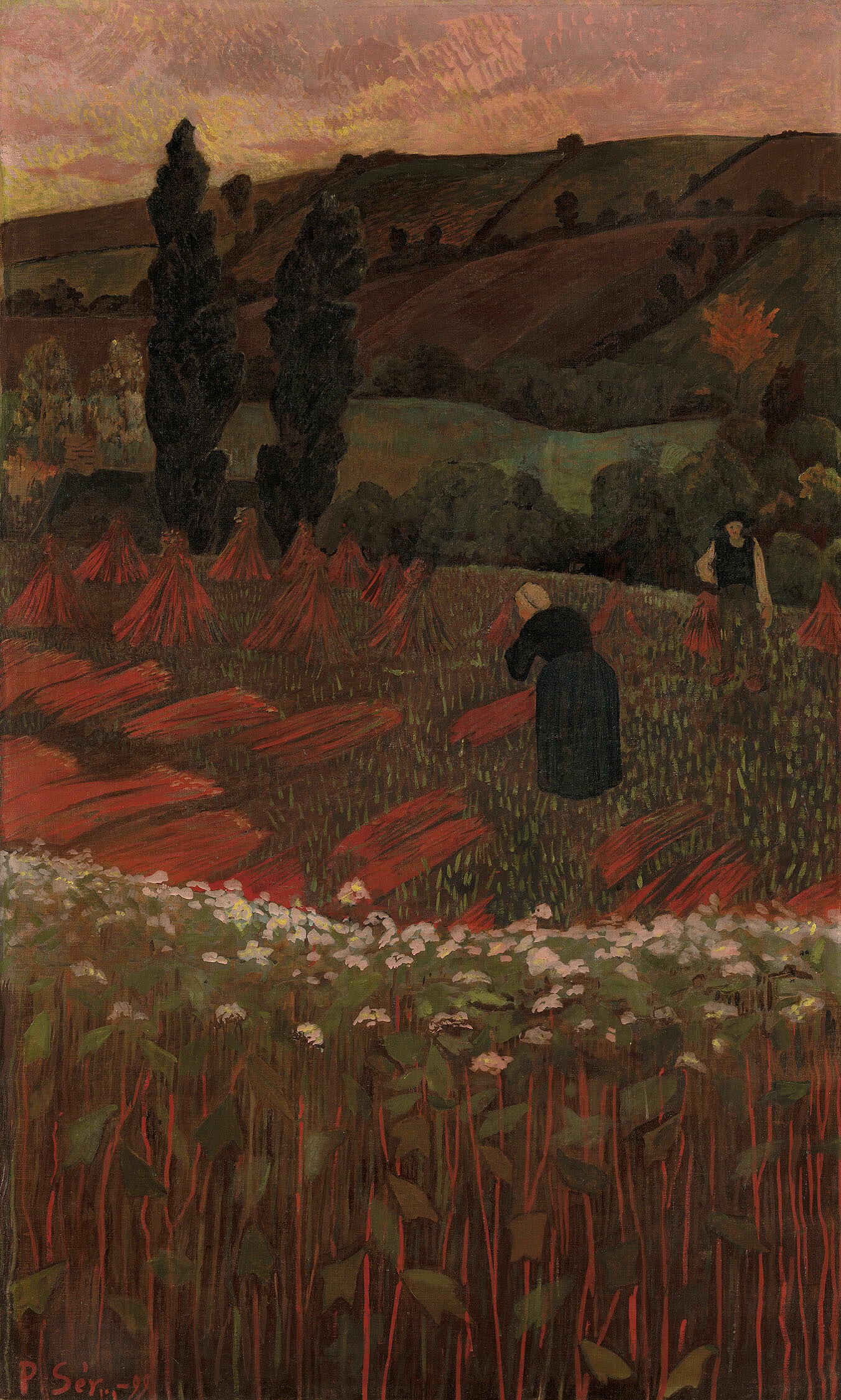
Paul Sérusier: The Harvest of Buckwheat (1899)
"We will not need to make time then …"
Late Summer emerges from a hot and dusty sameness anyone would swear might be neverending. Crops start ripening and, in their fashion, quickly overwhelm anyone engaging with them. Narrow windows hold promise, a precious week for some and only slightly longer for others. One starts gathering rosebuds while they may. Miss a day, and I might miss the whole year. Time becomes the premium resource, for the calendar already seemed full. Each successive crop squeezes in anyway, sideways and unsympathetic toward any whining. One learns early, and the lessons stick through frequent repetition, be prepared to sacrifice anything to preserve the Harvust.
Each year I try to hone my technique.
SocialMorality5
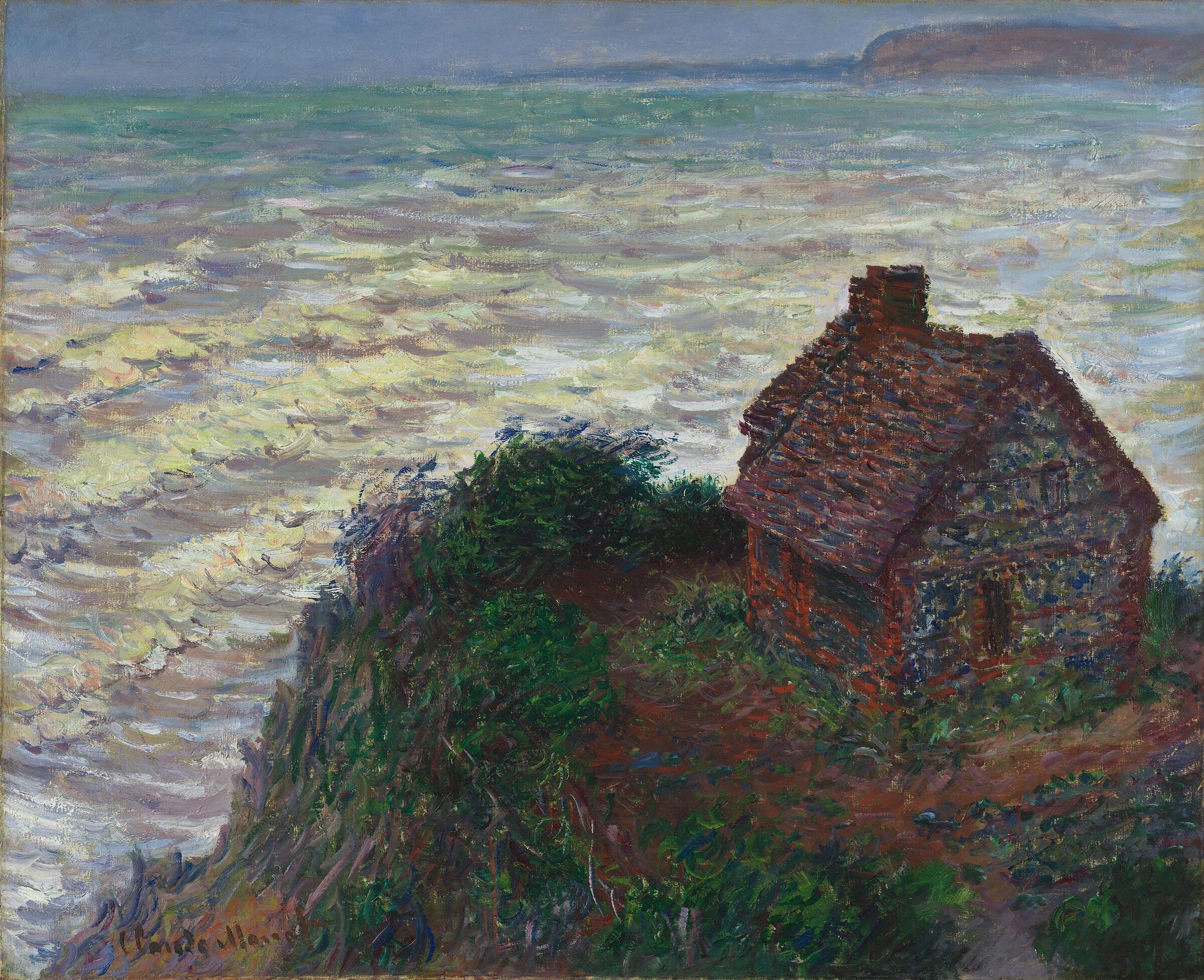
Claude Monet: House of the Customs Officer, Varengeville (1882)
"Would be potentates might finally receive a subpoena."
Now and then, a politician will come along primarily dedicated to misrepresenting everything. They might start small but eventually expand their practice to include every blessed thing that comes out of their mouth. They seem to be enjoying the time of their life without compunction or consequences at first. They don't age. Their story changes unselfconsciously into whatever form seems most useful at any moment, always delivered with the same supreme confidence. Anyone might come to question their judgment listening to these lies, for it violates some primal comportment to so blithely misrepresent. Eventually, even gravity loses meaning. There are those still believing, and everyone else. True believers, by which I mean those who have built their belief upon utter falsehoods, will maintain unshakeable belief, and that belief will become their uncontestable truth.
Not even politicians ever manage to avoid the truth forever.
SocialMorality4

Govaert Flinck: Blessing of Jacob (1638)
Mrs Snipkin and Mrs Wobblechin
Skinny Mrs. Snipkin,
With her little pipkin,
Sat by the fireside a-warming of her toes.
Fat Mrs. Wobblechin,
With her little doublechin,
Sat by the window a-cooling of her nose.
Says this one to that one,
"Oh! you silly fat one,
Will you shut the window down? You're freezing me to death!"
Says that one to t' other one,
"Good gracious, how you bother one!
There isn't air enough for me to draw my precious breath!"
Skinny Mrs. Snipkin,
Took her little pipkin,
Threw it straight across the room as hard as she could throw;
Hit Mrs. Wobblechin
On her little doublechin,
And out of the window a-tumble she did go.
" … the riskiest of all propositions …"
Morality, the Thou Shalts of behavior, necessarily restricts some behaviors and altogether enjoins against others. It would prove an absolute fool's mission for me or anyone to attempt to delineate all the terms and conditions within our or anyone's SocialMorality. In very real ways, one must come to know without explicit instruction; much of that learning can only come from sincere observation. Woe be to the unobservant, for they seem destined to embarrass themselves without knowing it. They will become the ones quietly looked down upon, the self-selected second- and third-class citizens who repeatedly disqualify themselves through their actions. These feral citizens complicate the operation of any decency-seeking society and create an attractive nuisance for the more acculturated, for unlike our Skinny Mrs. Snipkin, we daresent go throwing our little pipkins every time another manages to offend us. Rightness does not empower anyone to start tossing around their pipkin, however righteously engaged in.
The righteous hold greater responsibility than anybody.
SocialMorality3
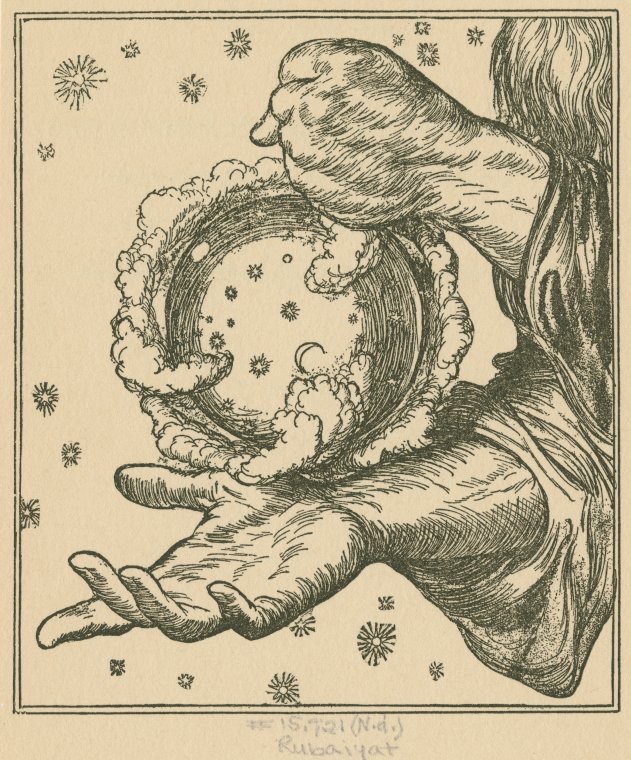
Edmund J. Sullivan:
Ah, love! could thou and I with faith conspire (1913)
"We remain in moral peril …"
Morality seems an inherently social entity, for it's anchored in commandments. An ethic involves an individual swearing to do something, I Shall, while a moral entails accepting a commandment, Thou Shalt. An immoral act involves disobeying an order or an understanding, violating a covenant between a respected authority and its supplicant. In the case of SocialMorality, the authority might well be disembodied, a cultural understanding. "One simply never on a Sunday does," for instance, the agreement appears more often tacit than explicit. The rules seem to have been forgotten or never understood in modern times. Throughout history, modern times have considered themselves the exception, present expressly to break traditions and make new ones. A core of more or less permanent morals has weathered such abuse and tends to resurface after much misuse and disservice. Gentlemen have comported themselves in specific ways throughout the ages despite passing fancies, for instance.
The new presents this unique challenge for us.
SocialMorality2
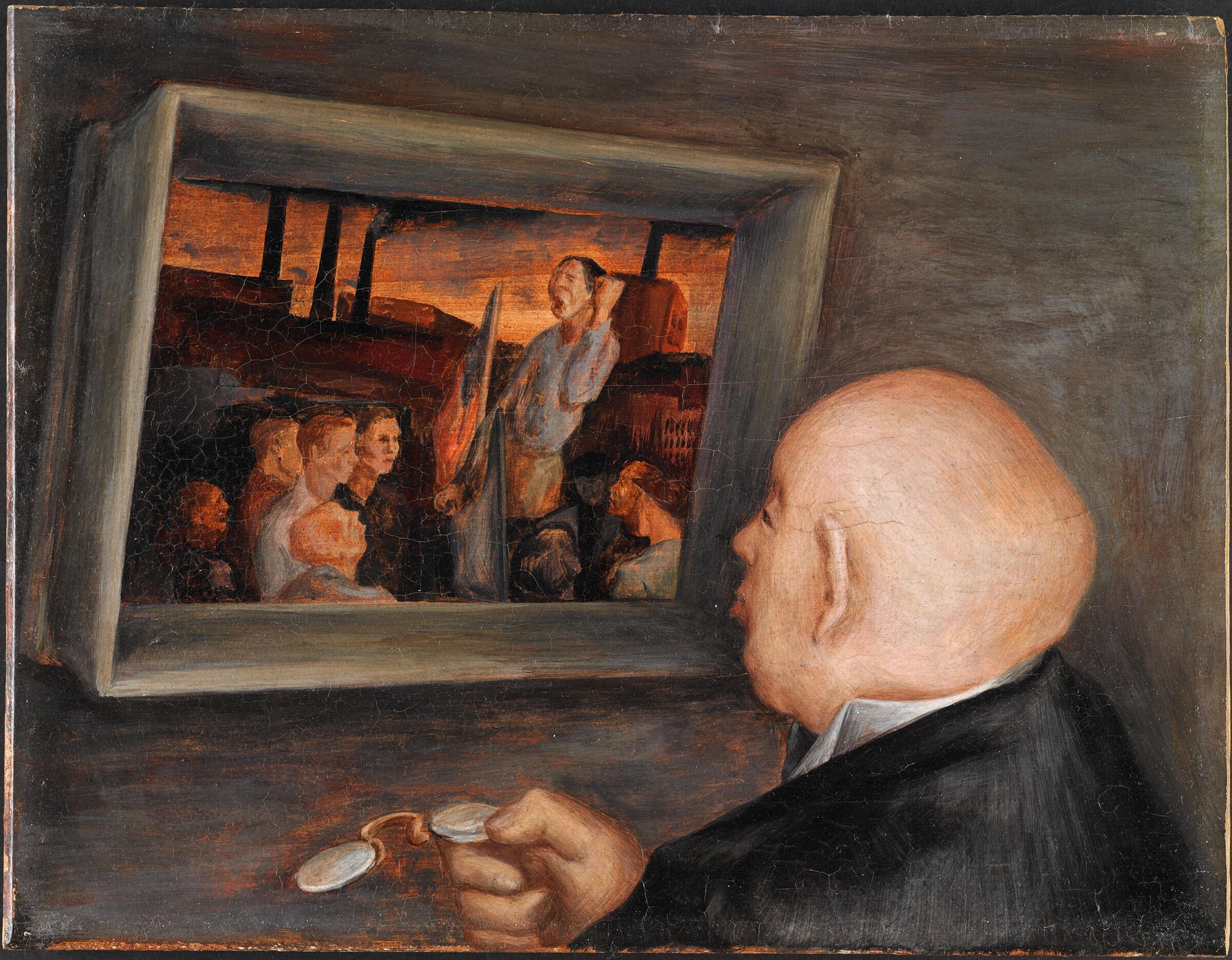
Mervin Jules: The Art Lover (1937)
" … seeking to act upon our interdependent moral duties …"
Every social act seems presumptuous, for we are born autonomous beings utterly dependent upon each other. Our social lives seem contradictory to our survival, but they aren't. Our autonomy too convincingly encourages us to isolate, discriminate, and individuate when we are inescapably plurals, “beings," not merely "being." It's all terribly confusing, and without some orientation, we might be destined to attempt to be -ists: rugged individualists or survivalists, neither of which seem anywhere near anybody's crown of creation. We live in communion, or we fail to thrive. Primitive formations of communion include cults, competing clubs, and patriotism, each of which paradoxically relies upon separatism as the medium for community, as its unifying purpose. Each vilifies difference instead of holding it supremely sacred. SocialMorality utterly depends upon a deep reverence for difference, not just the tolerance of it but an admiration equal to the wonder that difference actually entails. Difference seems to be the unifying principle underlying all social activity and, therefore, SocialMorality.
The purpose of school should be an orientation to—learning—SocialMorality.
SocialMorality
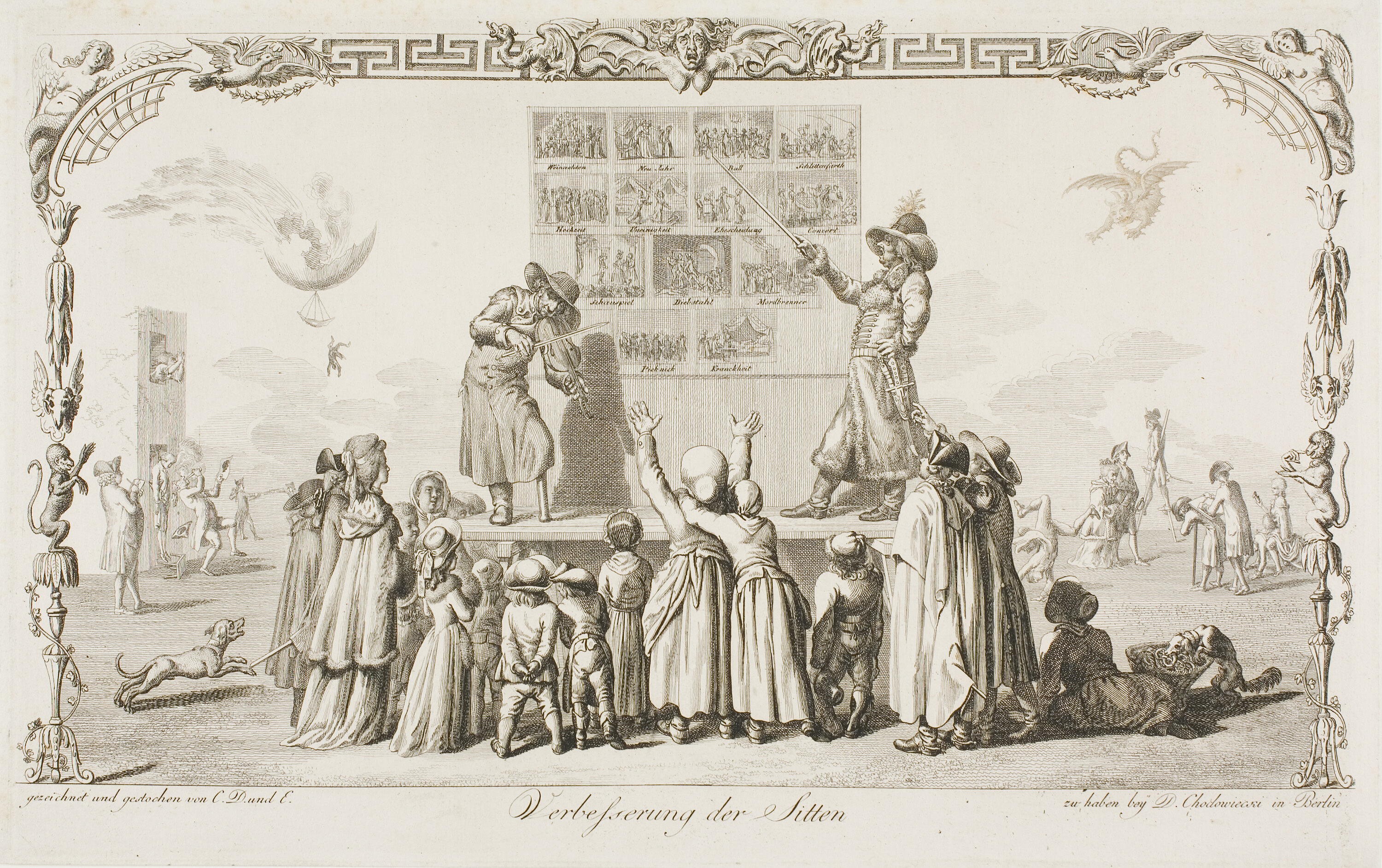
Daniel Nikolaus Chodowiecki:
The Improvement of Morals (1786)
"We were founded with a broader vision …"
I feel appalled at the many attempts by self-proclaimed moral conservatives to legislate and adjudicate abortion bans. They claim to be exercising moral imperative, while I can only see them violating a superior SocialMorality, for our society requires something different than individual morality, which only grows more iffy when considered from within any social context. What's deadly to any individual might not damage broader society, and what undermines society might have little to do with individual morality. Further, society sometimes sanctions gross violations of personal morality to protect their community, such as when soldiers get authorized to murder to defend their superior civilized society. Society deems soldier killings moral and necessary, though any strict conservative reading of individual morality would find them far over the line. We've always struggled to distinguish between permissible individual and social morality.
We abide by laws mainly because we respect the SocialMorality those laws represent.
VelveteenEvening
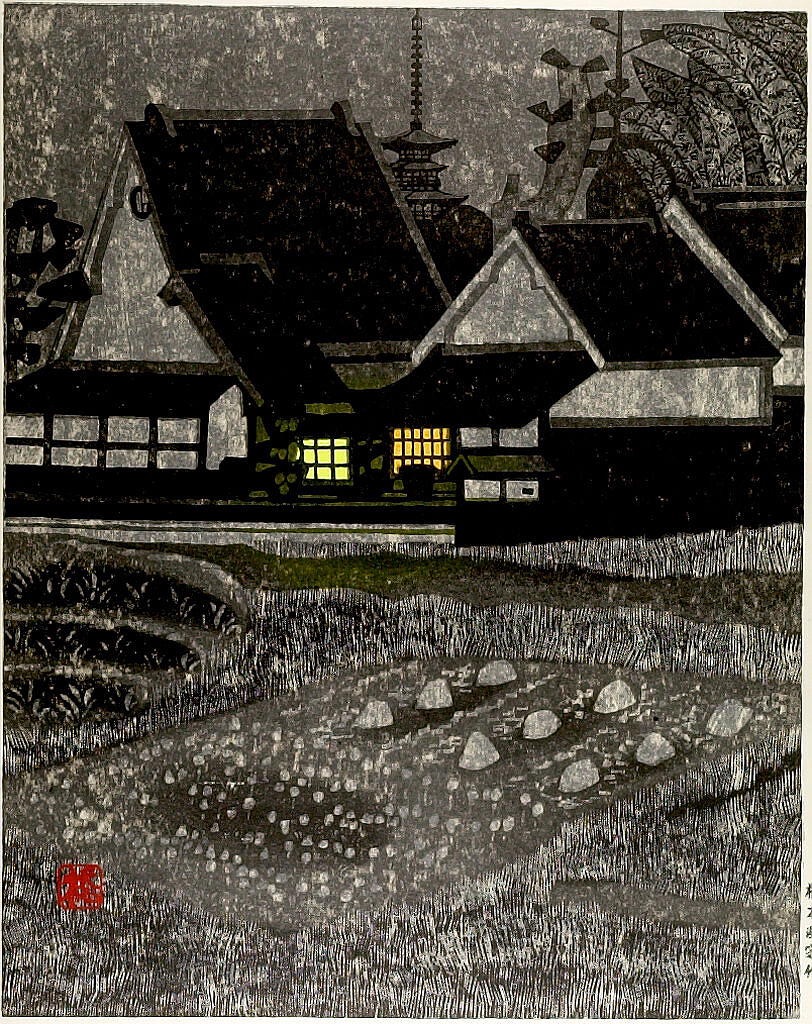
Hashimoto Okiie: Quiet Evening (1958)
"Once they're here, they're gone."
By late afternoon, the cats emerge from their moist shady lairs to make their way toward the back deck. If she's back from her day campaigning, the Muse shows up at about the same time. I'm already there waiting for this moment. I find the food and set out the cats' dinner. The Muse and I take to our chairs and survey the yard. She might wander back to check her tomato plants and cucumbers. Stink bugs have infested her tomatoes, and we're trying to chase them away with diatomaceous earth. We have yet to succeed. We ease into another VelveteenEvening.
I might set up the sprinkler, a considerable undertaking: moving hoses and figuring angles.
WritingSummary 08/10/2023
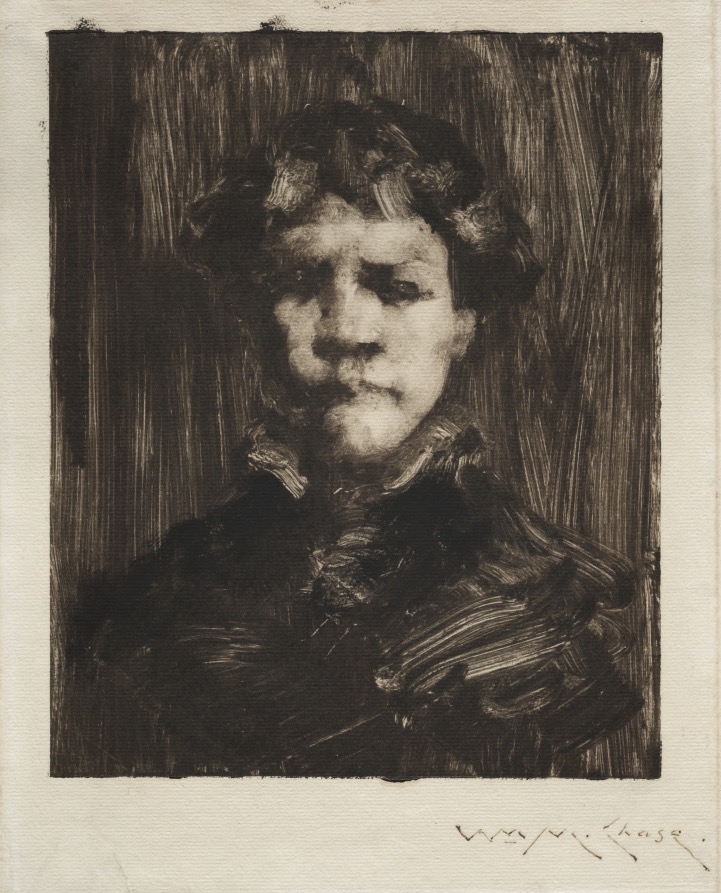
William Merritt Chase:
Head of a Boy (Date unknown, late 19th century)
"When I wonder why I keep doing this …"
In The Middle of a Muddle
Summer seems to stretch on forever and ever from everywhere here. Rain visited this week, bringing the first measurable moisture since April and a velvety feel to the starch-crisp breeze. The apricot tree finally stopped pelting us with jam bombs, and I let the lawn grow an extra week before mowing it again, mainly to protect my shoulder from any fresh insult. I relearned the folly of my native hesitance to visit the doctor after investing three months in ineffective treatment and discomfort, a repeating pattern. I deferred several projects in favor of nursing an unnecessary wound. I suspect I'll repeat this old pattern when I hurt myself again. A cluster of clogs cleared out this week, blockages that had been inhibiting movement and growth. As I wrote, unstuckness always turns out to be inevitable though it's the very last thing to seem possible from in the middle of a muddle.
Campaigning
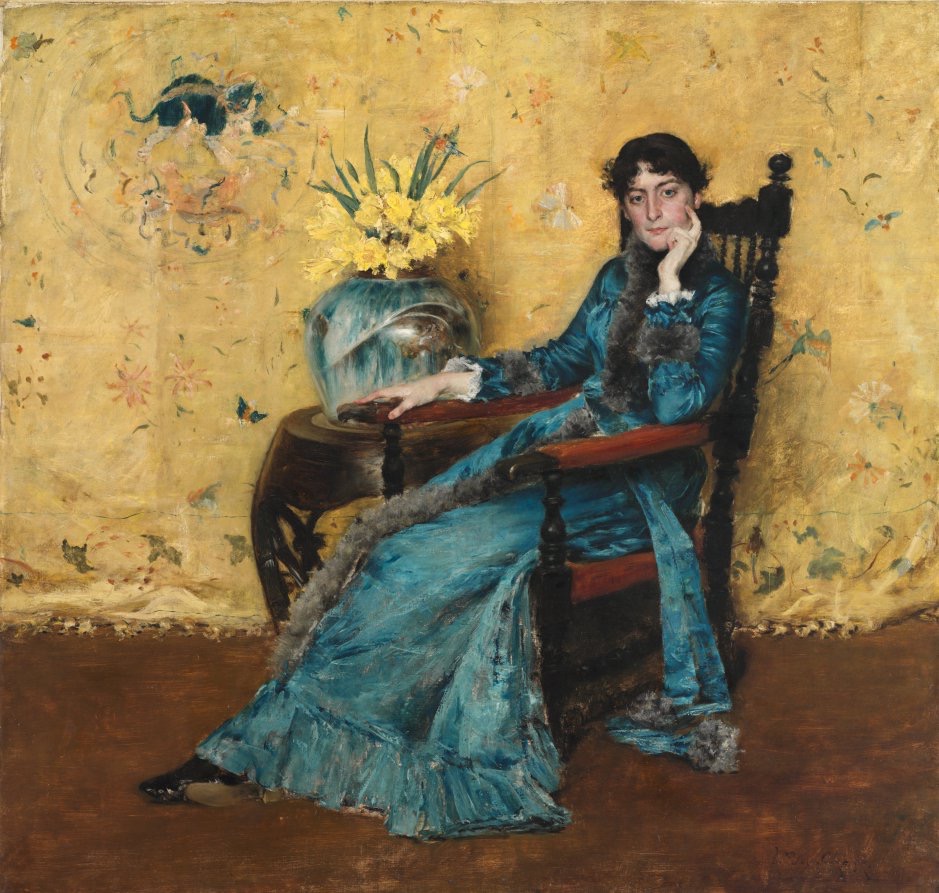
William Merritt Chase:
Portrait of Dora Wheeler (1882–83)
"I'm still dabbling."
The picky details stall me. I don't understand the underlying patterns governing the effort. I cannot find what I need when I need it. Her organization baffles me. My organization has yet to emerge, and might never. I've forgotten how to sort a spreadsheet if I ever knew how. I cannot access her Google Drive. I have to take a photo of her QR Code, attach that to an email, then retrieve and edit it into a graphic for use in the document I'm creating. I haven't heard half the rumors governing the effort. I just learned about some gatherings I thought I was supposed to be scheduling. Just creating a simple invitation freezes me. I suddenly do not know what to say to anybody. She produced a handout using the free software that came with some stationery? I can't reuse any of that content, so I use my two-and-a-half typing fingers to transcribe it. She uses a font I do not have and don't want. I'm supposed to call somebody about something, but I've forgotten who and what.
Campaigns are supposed to start naive and full of hope.
Convergence

Hanns Lautensack: Landscape with the Town on a River
and the Cottage between Trees (1551)
" … purposefully moving forward again."
Once stuck, things tend to stay stuck forever—or almost forever. Points of Convergence emerge. Who knows from where? It's as if stuckness becomes disgusted with itself, weary of the abiding irresolution, to finally take its fate into its own fists, for stuckness seems a wasting state, one inherently incapable of sustaining itself forever. It appears to possess some self-respect such that it cannot abide its own idleness and finally injects some mobility into its existence. However this happens, one can be sure this will happen regardless of how hopeless any context seems. There's always space for dreams, which take up very little space, though dreams seem infinitely expandable. To have one might be to hold the whole universe because with them on hand, anything seems possible.
Since my shoulder seized up in April—it's now August—I fell into a period of stuckness.
InstantMessaging
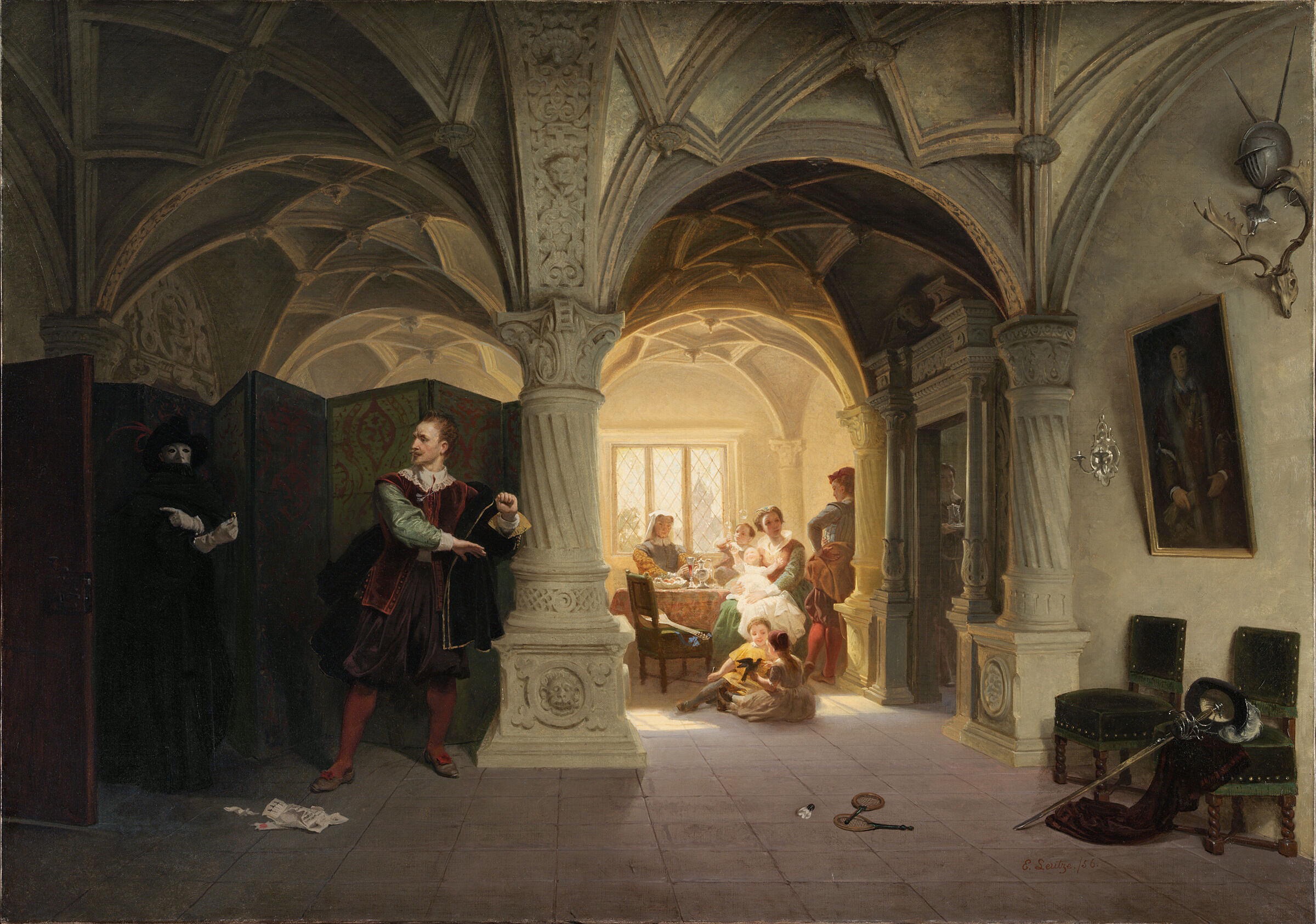
Emanuel Gottlieb Leutze:
Entertaining the Messenger in the Outer Hall (1856)
"We are the apps we invoke …"
I live surrounded by apps I do not know how to operate, whose instruction manual might just as well not exist. I've never cracked an instruction manual for even the most complicated. I have consented to try to sit through a tutorial or two, but certainly not more than a couple, and even those, I'm sure I never made it to the bottom of any of them. Apps are supposed to be intuitively designed, meaning they're supposed to work the way any odd user might expect them to work. Certain conventions seem universal across whole classes of apps. Map apps work similarly, and so do search apps. The differences between them might only come into play if one aspires to become a PowerUser, the sole class of app user who understands how an app works. These are such a tiny minority as not to be worth counting or counting on. They're the ones who supply the incomprehensible answers to the questions you post on an app's User Forum.
I presume I know how to operate the more prominent apps on my devices.
Surly
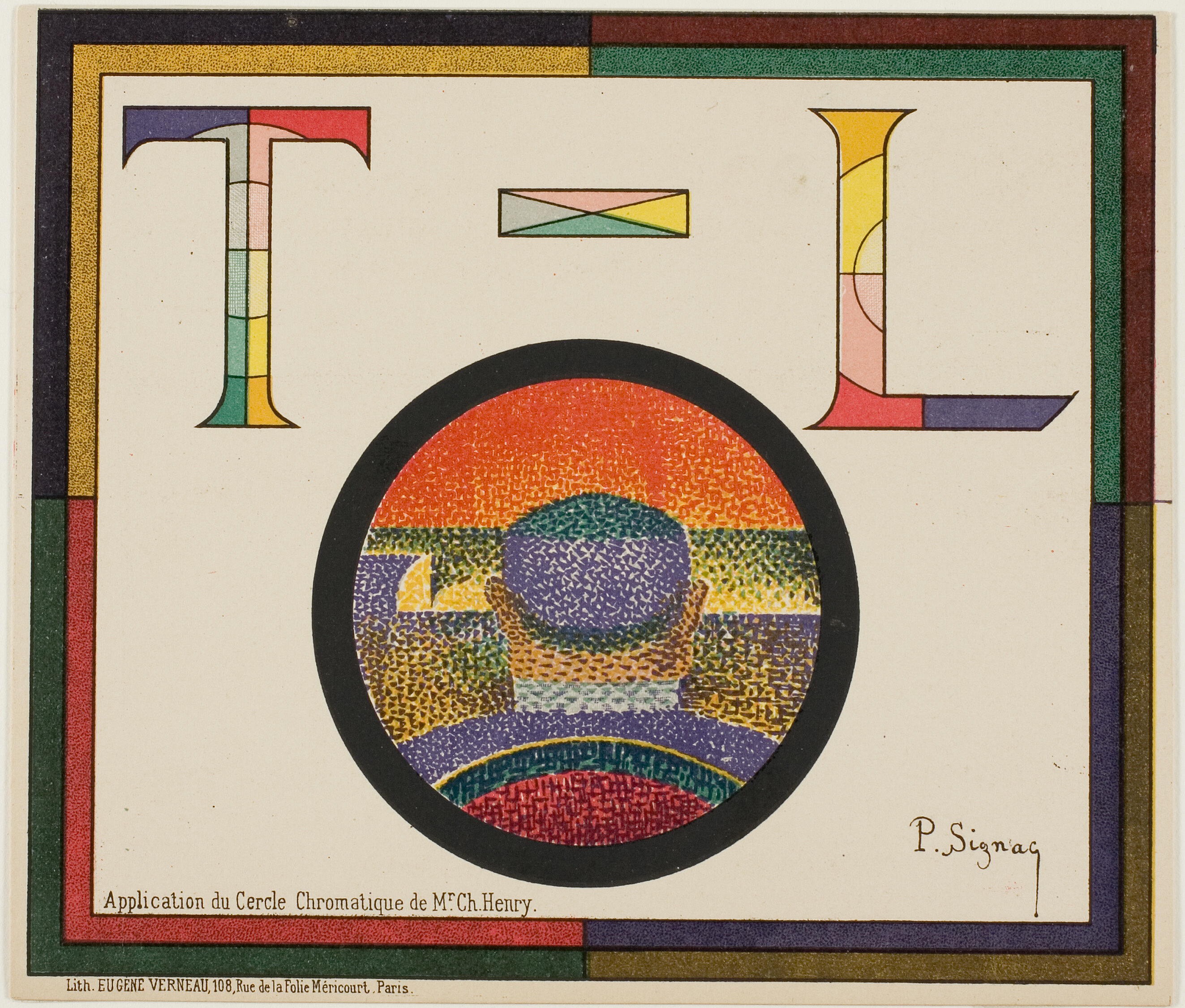
Paul Signac: Chromatic Circle (1888)
" … if you woke up as somebody else again …"
What kind of person am I? This question qualifies as a trick one because it couldn't have just one answer. Like those math problems that produce ambiguous yet valid solutions, this question undermines the whole purpose of calculating, of asking. The presumption that there might be a crisp and straightforward response disqualifies any more nuanced or less precise reply, however more accurate any might be. I am many things and irreducible to any single characterization. Like everybody, I consider myself generally nice, but even I've noticed some exceptions. Keep me from my work, and I can get Surly and disagreeable, "uncharacteristically" cranky, short-tempered, and even mean. I might justify this switch to myself in ten thousand ways, but none genuinely explains such a flip. It's uncalled for, seen as unseemly, perhaps unforgivable. The least civil among us are probably just the most scared.
I depend upon myself to prevent such slides.
Beaning
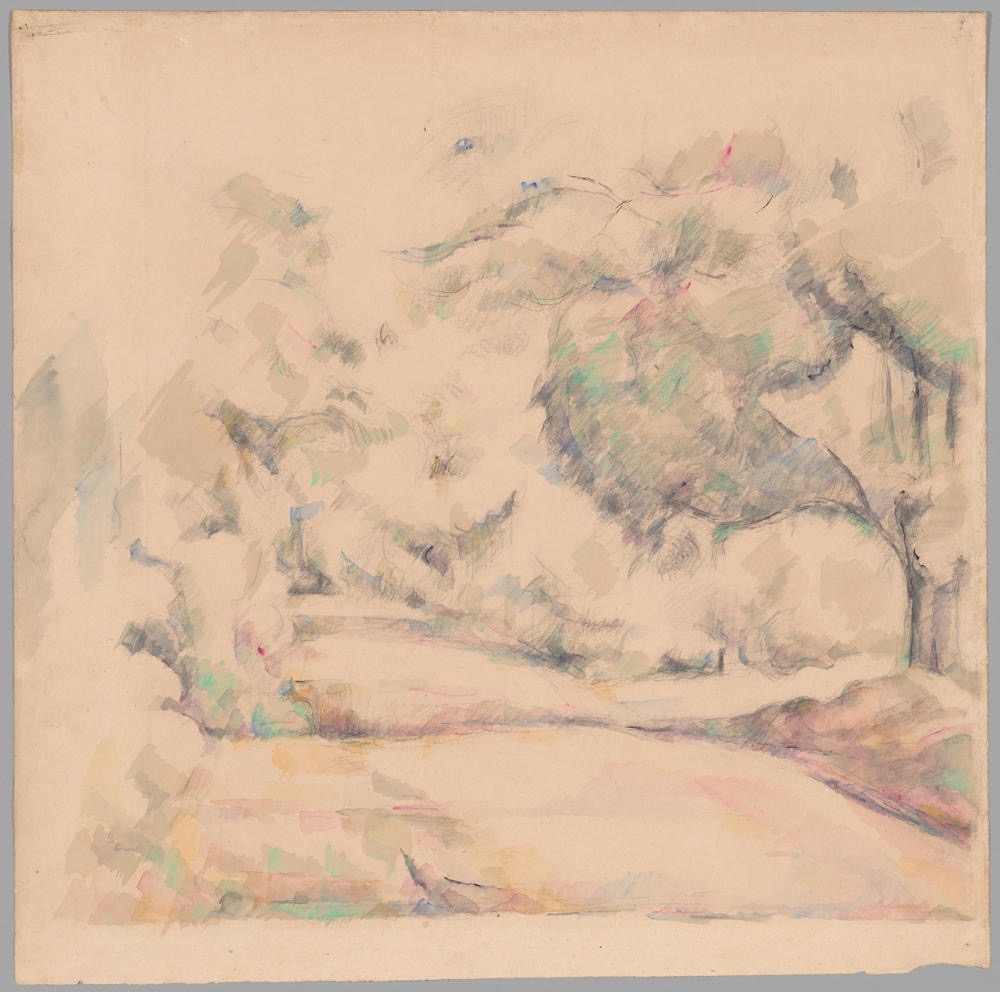
Paul Cézanne: Road in Provence (c. 1885)
" … the Rosetta Stone recipe for beans."
My life as an erstwhile cook might most easily represent an extended study of dry beans in their near-infinite variety. I was always a fancier of beans. Bean Pot qualified as my favorite childhood supper. I'd ladle pressure-cooked pintos over a slice of bread and swirl a melting hunk of Tillamook Medium Cheddar into the mix to complete the protein and complicate the flavor. From there, I attempted to cook every size, shape, and variety of dry beans I encountered, from split dal to Christmas Limas, with varying success. My beans would often seem overcooked, lacking bite and texture, refried right out of the pot. Other times, I could not get the buggers to soften. Nobody's gastrointestinal tract appreciates blood-rare garbanzos.Further, the locations of my various kitchens and varying techniques influenced the results. Beans might never thoroughly cook at nine-thousand feet in the Rockies and might finish too quickly so that a moment's inattention can render them ruined nearer sea level in Seattle or Portland or even here at The Villa. I remained an enthusiastic, if inconsistent, producer in the Beaning department.
Three significant insights have improved my results over time, and an additional most recent experience promises more consistent future results.
Paean
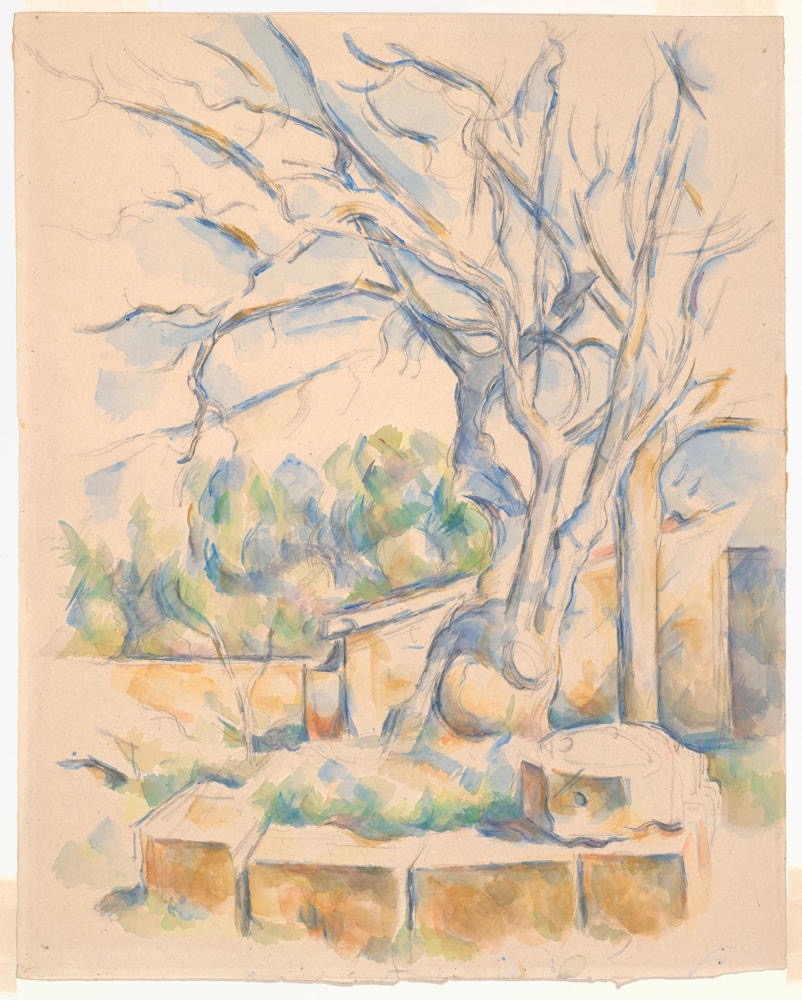
Paul Cézanne:
Pistachio Tree at Château Noir (c. 1900)
Paean: a thing that expresses enthusiastic praise. (Oxford Languages)
" … nothing compared to most."
I sing today a song of praise for pain, that preeminent sensation. Above all others, it garners attention. It amplifies apprehension and can inflict damage with mere anticipation. Its sharpness can dull the brightest. Its dullness can sharpen even the boldest. Its lingering promise can thwart even the finest intentions. Its promise can utterly undermine inspiration. The dread of it distorts reason. Attempting to shed it encourages addiction.
Why a Paean for pain?
RightEnough

John Vachon: Migrant fruit workers,
Berrien County, Michigan (1940)
" … I'd be hard-pressed not to confess …"
Problem solver that I strive to be, I too easily neglect to appreciate how things already are or already seem to be. I too easily see what's missing while peering right through whatever might be sitting there before me. I consequently miss my full share of opportunities to appreciate what I have. I see that my lawn needs mowing more than I perceive I even have a lawn that's mostly still growing despite or in defiance of the summer sun burning at it like a blowtorch. How fortunate that it hasn't gone to weeds, that I still have something to need something from me. I see the unfinished chores queue before I notice all I've accomplished. I pressure myself to keep pressuring myself when I might kick back instead.
My sensitivity to absences seems self-destructive.
WritingSummary 08/03/2023
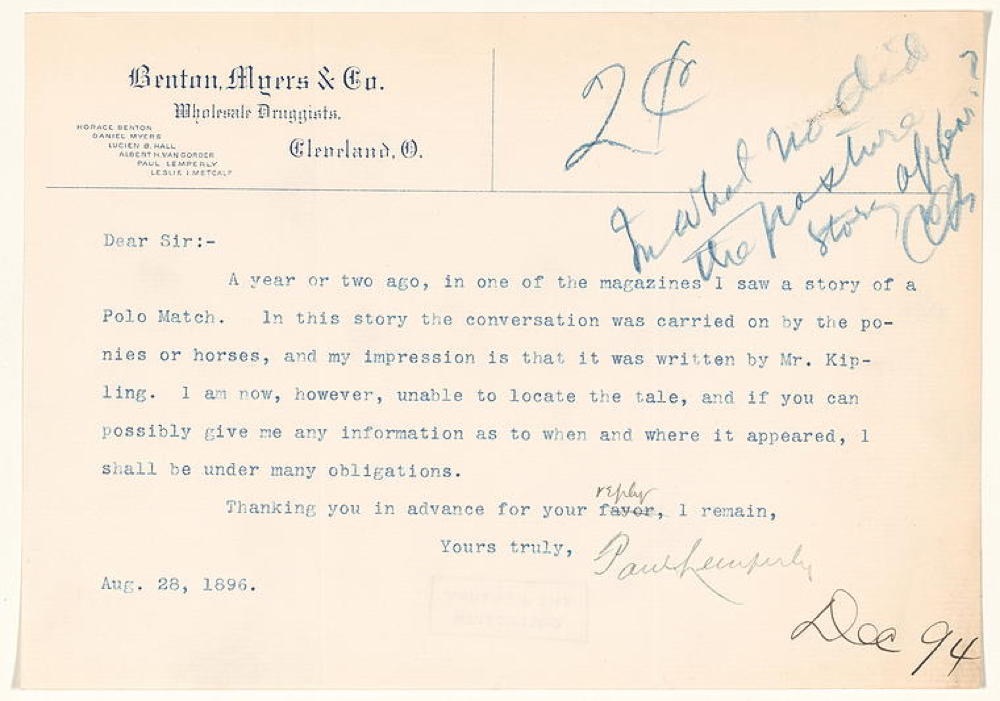
Paul Lemperly: Correspondence (1896)
Right Enough With This World
A numbing sameness settles in for the second, the downhill half of any season. What was heartily welcomed becomes merely moribund, done yet continuing, a walking finish. I revel in open windows to sit at my desk with a morning breeze blowing over, around, and almost through me while I write, yet I warmly anticipate an overnight low, rendering it too cold some days. The Muse and I flee indoors during the hottest part of the day, hiding until the fierce sun slips further West to leave the back deck in shadows while a sprinkler whispers beneath us. As context goes, so goes content. My writing week mirrored this context. I felt over-stretched, reaching as if I was reduced to leaching out the final inches from an over-used well. The water bill will astound us. The stink bugs have been assaulting The Muse's tomatoes. The composter groans beneath its belly, full of cull apricots. The driveway features leathery patches where the sun dried some apricots before I could clean them up. The yard smells like apricot jam. All's right enough with this world.
Politicking
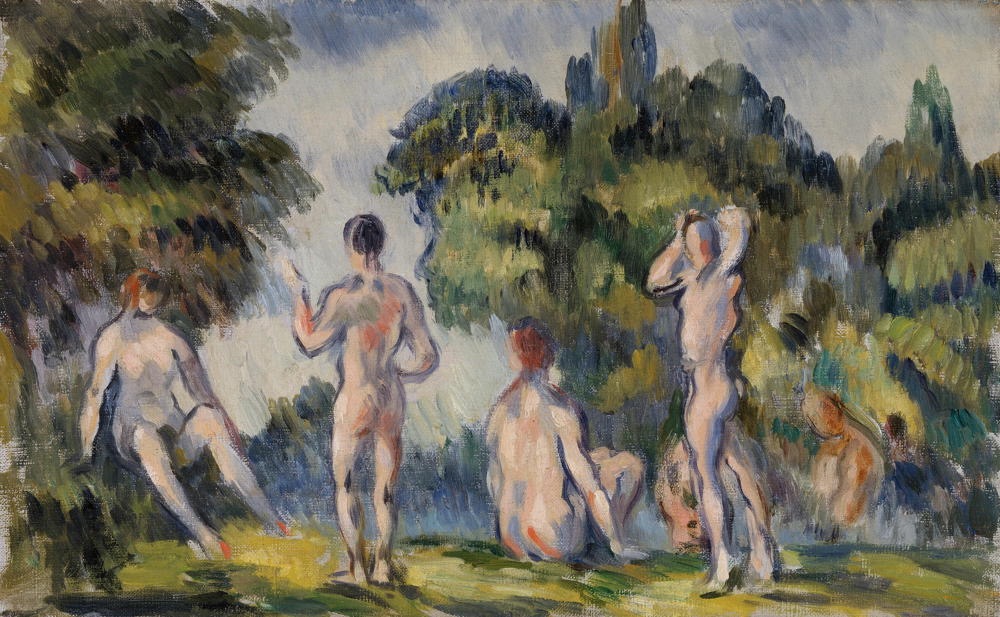
Paul Cezanne: Bathers (1890/94)
"I'm learning to believe."
The Muse turns out to be the most naturally gifted retail politician I've ever known. She might be better than Bill Clinton ever was and a damn sight more authentic, too. She insists that as a candidate (for District 2 Walla Walla Port Commissioner), she only has two responsibilities, 1) talk to as many people as possible, and 2) raise money. She's so far, with two and a half months since she registered as a candidate, excelling at both responsibilities. Fortunately, she's also assembled a crackerjack campaign team, of which I'm the conscripted and periodically competent campaign manager. Still trying to find my footing, I have yet to act like a campaign manager; but the strategy seems not to have suffered from my initial ineptness.
Not a day passes, but what she returns with another astounding story.
Harmony

Paul Signac:
In the Time of Harmony:
the Golden Age is not in the Past,
it is in the Future (1893-95)
"The road to wherever we're going …"
Yesterday, our Justice Department indicted our former president on conspiracy charges. A man who swore to defend our constitution conspired to undermine it. He'll be arraigned tomorrow, and his actual trial might not begin until a year from now. Most commentators contend that it will only end after he exhausts all of his appeals, which might take years. Still, I feel relieved that the indictment's finally public. After the string of House January 6th Committee hearings, completed seven full months ago, many wondered if Justice would ever carry out the committee's recommendations and indict at least the ex-president. Six unindicted co-conspirators were also mentioned in the indictment, not because they will not be indicted, but apparently to keep this indictment simple enough to allow clean litigation. The ex-president has already proven that he'll employ any means to delay prosecution. Courts have been actively denying his frivolous motions since his first indictment. This latest string of accusations seems the most serious and might take precedent over his many other charges, moving this set to the head of an ever-lengthening line. Nobody sees any end to this.
I slept the sleep of the satisfied last night, even though I know yesterday was more like the start than any end of anything.
Incompetenced
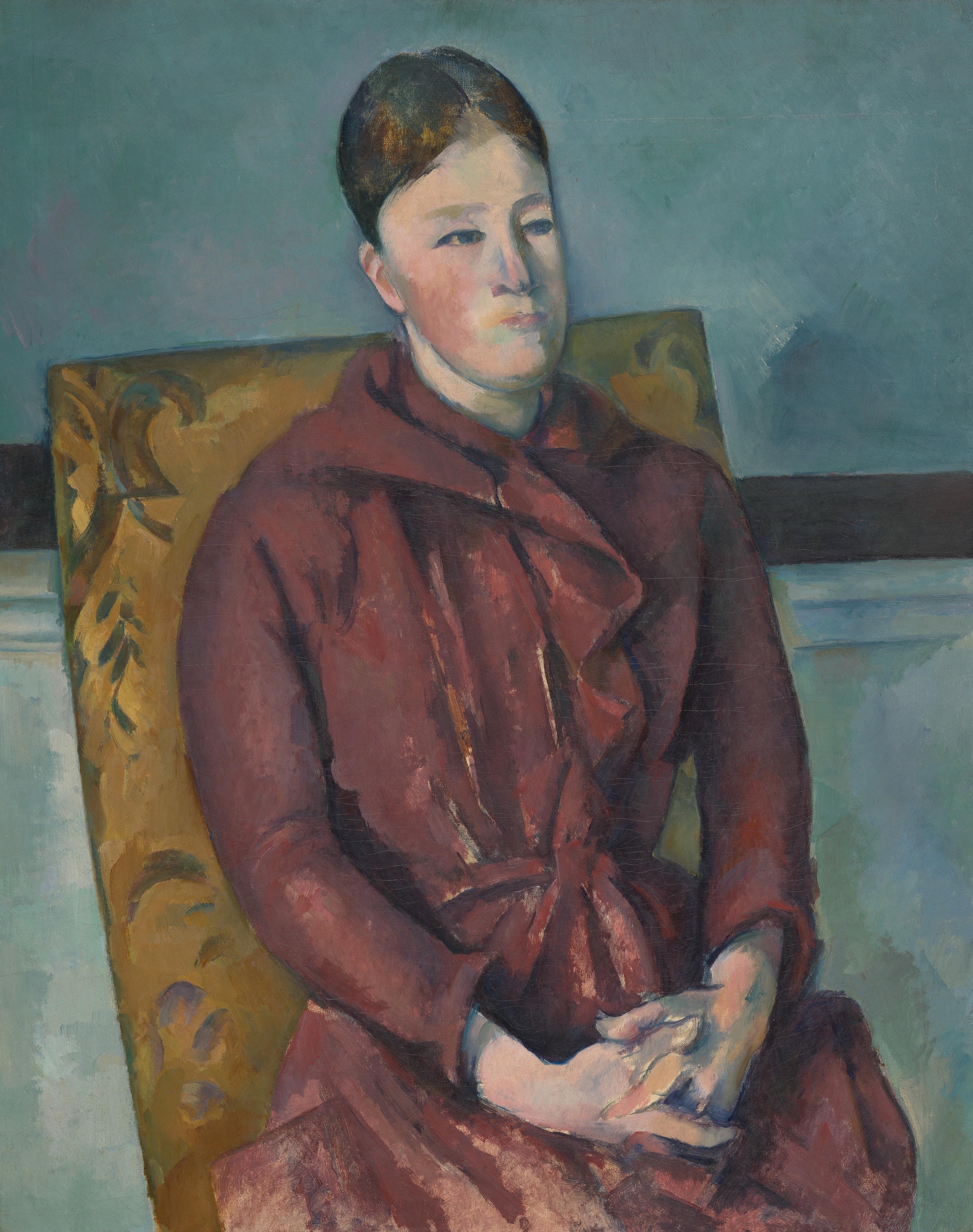
Paul Cezanne:
Madame Cezanne in a Yellow Chair (1888-90)
" … how to compensate for my obvious shortcomings."
"At some point during our upcoming engagement, you should come to believe that you've hired the most incompetent consultant that ever lived. It's what we choose to do then that will determine the success of this effort." This was how I often summed up my contracting conversation with a prospective client. It sometimes seemed even to me that I was attempting to sabotage the effort before beginning work, for even speaking of incompetence might awaken a genuine jinx and damn the effort before it started. Furthermore, in this culture, one should never speak of incompetence in the first person or admit to even glancing knowledge about the affliction. Incompetence is believed to exclusively belong to somebody else and never, ever, anyone's self, yet there I was, freely admitting an impending personal incompetence. I suppose I was daring my client to reject me or hold me blameless. My experience had taught me that every engagement would eventually encourage, if not insist, upon manifesting some incompetence. What value would I encourage by pretending it wouldn't happen this time?
It happens.


